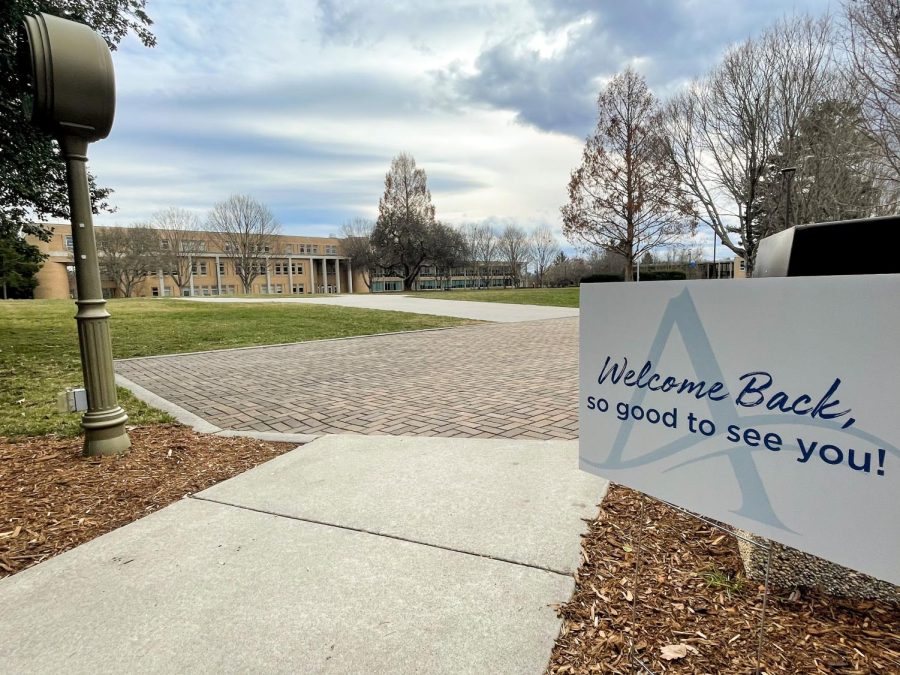Remote or in-person learning? How professors and students create a semblance of normalcy
January 18, 2022
With the start of UNC Asheville’s spring term commencing online after an in-person fall semester, faculty and students revert to former methods of teaching and learning.
From remembering how to share a screen to orchestrating breakout rooms and peer participation, the question arises for the UNCA community, how can routine be maintained as the semester attempts to transition to in-person education?
Don Diefenbach, professor and chair of mass communication at UNCA, said he brings a sense of elevated enthusiasm to his online classes. He said interactive Zoom sessions with greater frequency of transition points can help to negate many challenges Zoom classes pose.
“I find that I bring a lot of energy to my Zoom classes. I try to compensate for the pitfalls of being a talking head by turning up the energy dial even more,” he said.
On Dec. 31, UNCA announced the first week of spring semester classes would occur through online instructional means, with in-person classes beginning Jan. 18.
Diefenbach said he previously questioned the ability online learning would have in forming close-knit classes. Since teaching both online and in-person courses, he said he can see positives and negatives in each.
“I think we have all made adjustments by necessity in a trial by fire and in some ways, I feel more cohesiveness and stronger connections online than in person these days,” the mass communication professor said.
UNCA continues to implement an on-campus mask requirement as part of their COVID-19 protocols.
“In person, all I see are a bunch of eyes peering over masks. Online, everyone can breathe and feel comfortable and I see smiles and I see everyone’s name with a face from the very first day of class,” Diefenbach said.
Roy Farrell, a senior completing his last semester before graduating, tested positive for COVID-19 a week before moving back to campus. Instead of rejoining his peers in Asheville to begin the spring semester, he remained at his family’s home in Florida.
“It’s been really convenient that the first week was online. Otherwise, I would have missed an entire week of class. I just hope this isn’t a precursor for the rest of the semester because if it stays online, I certainly would be disappointed,” he said.
Many students, particularly those in their final year at UNCA, said they remain hopeful the school will take necessary precautions to ensure a safe and normal spring semester.
“I know people who are worried about going back online because they’ve either taken time off from school or haven’t had much of a normal college experience yet. They’re hoping we’ll stay in person for the spring,” Farrell said.
Arianna Cadavieco, a senior, said she believes UNCA made the right decision by starting online, given the severity of COVID-19’s omicron variant.
“Almost everyone got sick. It got in front of us before we could even realize it. I feel like going back in person will be safe as long as the school is taking the number of positive cases seriously throughout the semester,” she said.
While some students, including Cadavieco, favor the calm and ease of online classes, the senior also said she does better in courses she can physically attend.
“One positive of online classes is honestly that I don’t have an excuse to miss a class. Though I don’t feel particularly motivated at home doing class. I generally get distracted way easier,” she said.
Diefenbach said class quality relies greatly on the ability to connect with one another, which is something not so easily achieved with masks.
“I still think there is nothing as good as the energy of being in a live space together, but that is assuming we are not wearing masks. The masks change that whole premise,” he said.
Cadavieco said while everything remains uncertain with how the semester will continue, maintaining a morning routine she can control regardless of online or in-person classes has been useful in providing regularity to her schedule.
“Whenever I get ready for the day, I feel ready to do more tasks. Although learning can be fun, it could sometimes feel task based,” she said.
For Farrell, paying greater attention to the impact his actions have on his class engagement and environment have helped him balance the switch between instruction methods.
“At least in the aftermath of my junior year, being online I feel as though online classes have incentivized me to be more disciplined. If my camera is going to be on, I want my room to look nice, and if I don’t want to be as easily distracted, I’ll put my phone in a drawer. I think it’s just pushed me to be a bit more on top of things overall and it’s translated into how I approach in-person classes too,” he said.
As the unpredictable semester kicks off its second week, Diefenbach said he highly recommends students begin to let go of expectations and attachments.
“It’s good advice for any time, but especially now. The only thing certain these days is more uncertainty ahead, so just be open to rolling with whatever unfolds and know that we will have successful learning experiences no matter where or how we meet and share ideas,” Diefenbach said.


![Brooke Pedersen [second from the right] and Luis Reyes [right] hold banners during the Wrap The Woods event.](https://thebluebanner.net/wp-content/uploads/2025/09/ELIZABETH_PRITCHITT_IMG_3470-1200x804.jpg)















